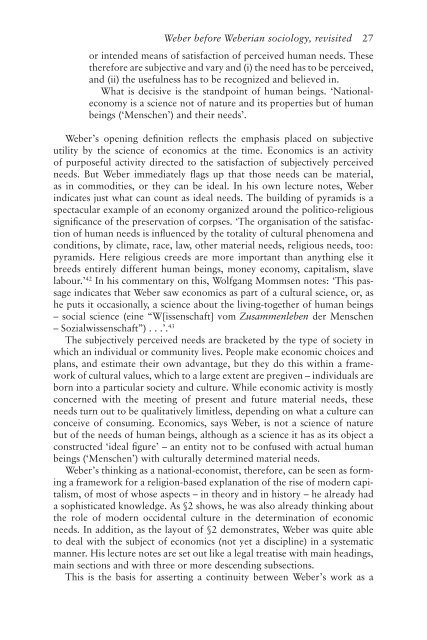Understanding Weber
Understanding Weber
Understanding Weber
You also want an ePaper? Increase the reach of your titles
YUMPU automatically turns print PDFs into web optimized ePapers that Google loves.
<strong>Weber</strong> before <strong>Weber</strong>ian sociology, revisited 27<br />
or intended means of satisfaction of perceived human needs. These<br />
therefore are subjective and vary and (i) the need has to be perceived,<br />
and (ii) the usefulness has to be recognized and believed in.<br />
What is decisive is the standpoint of human beings. ‘Nationaleconomy<br />
is a science not of nature and its properties but of human<br />
beings (‘Menschen’) and their needs’.<br />
<strong>Weber</strong>’s opening definition reflects the emphasis placed on subjective<br />
utility by the science of economics at the time. Economics is an activity<br />
of purposeful activity directed to the satisfaction of subjectively perceived<br />
needs. But <strong>Weber</strong> immediately flags up that those needs can be material,<br />
as in commodities, or they can be ideal. In his own lecture notes, <strong>Weber</strong><br />
indicates just what can count as ideal needs. The building of pyramids is a<br />
spectacular example of an economy organized around the politico-religious<br />
significance of the preservation of corpses. ‘The organisation of the satisfaction<br />
of human needs is influenced by the totality of cultural phenomena and<br />
conditions, by climate, race, law, other material needs, religious needs, too:<br />
pyramids. Here religious creeds are more important than anything else it<br />
breeds entirely different human beings, money economy, capitalism, slave<br />
labour.’ 42 In his commentary on this, Wolfgang Mommsen notes: ‘This passage<br />
indicates that <strong>Weber</strong> saw economics as part of a cultural science, or, as<br />
he puts it occasionally, a science about the living-together of human beings<br />
– social science (eine “W[issenschaft] vom Zusammenleben der Menschen<br />
– Sozialwissenschaft”) . . .’. 43<br />
The subjectively perceived needs are bracketed by the type of society in<br />
which an individual or community lives. People make economic choices and<br />
plans, and estimate their own advantage, but they do this within a framework<br />
of cultural values, which to a large extent are pregiven – individuals are<br />
born into a particular society and culture. While economic activity is mostly<br />
concerned with the meeting of present and future material needs, these<br />
needs turn out to be qualitatively limitless, depending on what a culture can<br />
conceive of consuming. Economics, says <strong>Weber</strong>, is not a science of nature<br />
but of the needs of human beings, although as a science it has as its object a<br />
constructed ‘ideal figure’ – an entity not to be confused with actual human<br />
beings (‘Menschen’) with culturally determined material needs.<br />
<strong>Weber</strong>’s thinking as a national-economist, therefore, can be seen as forming<br />
a framework for a religion-based explanation of the rise of modern capitalism,<br />
of most of whose aspects – in theory and in history – he already had<br />
a sophisticated knowledge. As §2 shows, he was also already thinking about<br />
the role of modern occidental culture in the determination of economic<br />
needs. In addition, as the layout of §2 demonstrates, <strong>Weber</strong> was quite able<br />
to deal with the subject of economics (not yet a discipline) in a systematic<br />
manner. His lecture notes are set out like a legal treatise with main headings,<br />
main sections and with three or more descending subsections.<br />
This is the basis for asserting a continuity between <strong>Weber</strong>’s work as a




